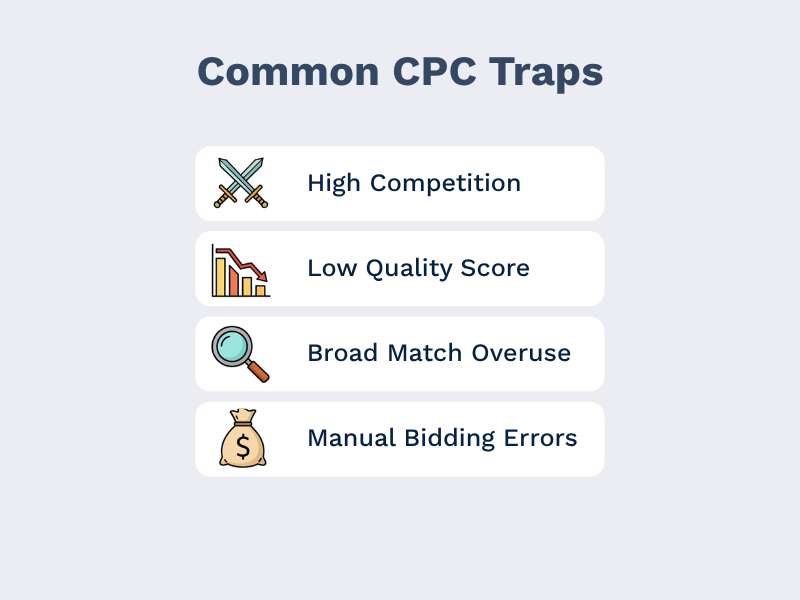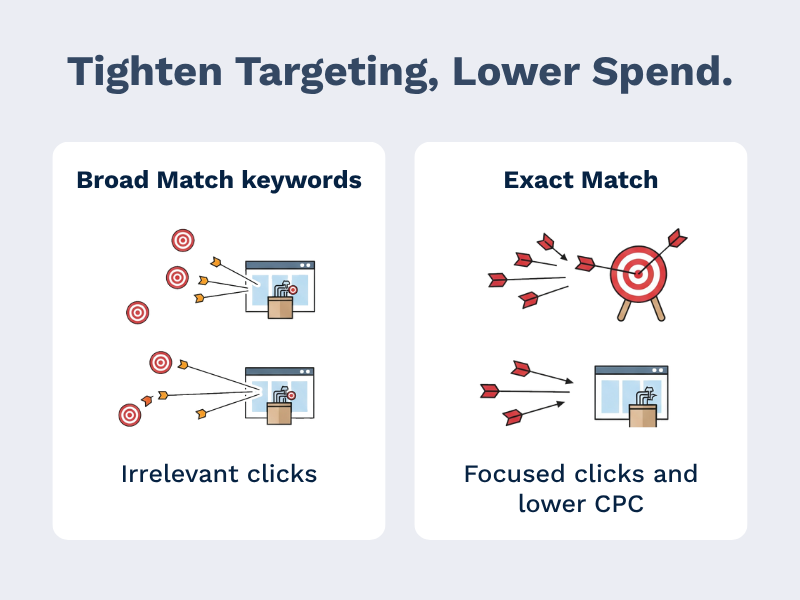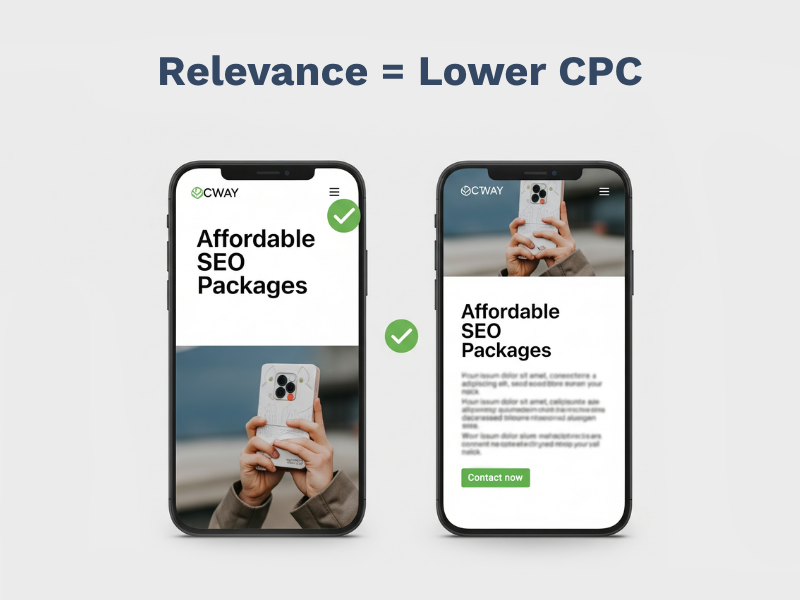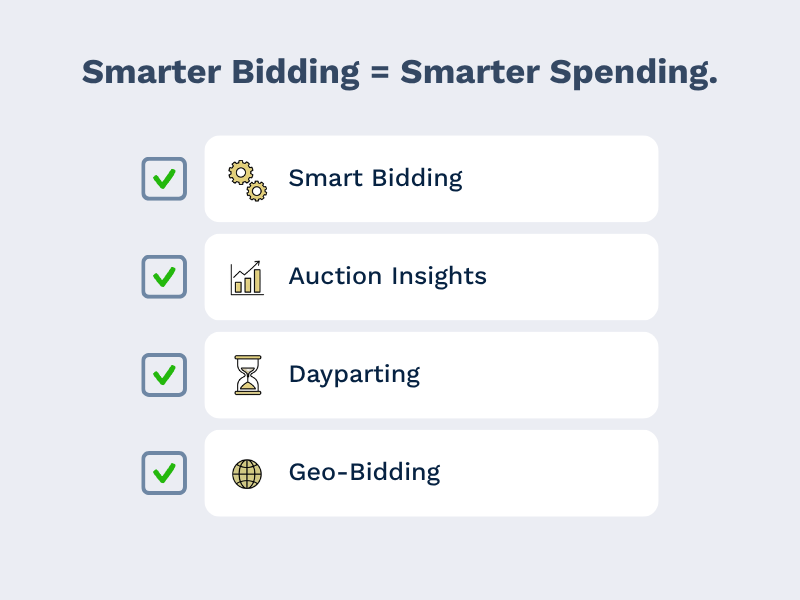You’ve carefully structured your Google Ads campaign. The keywords make sense, your ads are live and you’re driving traffic, yet every click is costing more than expected. Meanwhile, your competitors seem to be achieving better results at a lower price.
This is a common frustration for many businesses: spiralling Google Ads CPC (cost-per-click) that drains the budget without delivering a proportional return.
The good news? High CPCs aren’t random; they’re often the result of correctable issues, like poor keyword targeting, missed bid opportunities, or low ad relevance. With a few strategic tweaks, such as smarter keyword bid adjustments and improved ad relevance, you can cut your costs and increase your ROI.
Studies show that a low Quality Score can double your CPC, while poor targeting can increase costs by up to 400%. Industries with intense competition, like legal or plumbing, see average CPCs as high as $25 per click. With CPCs rising 15 to 30% year-over-year in some sectors, refining your keyword strategy, targeting and ad relevance is crucial to keep costs in check and maximise your ROI.
In this blog, we’ll break down why your CPCs might be higher than they should be and what you can do to turn that around.

If your Google Ads CPC is consistently higher than you'd like, you're not alone. Several common factors could be driving up your costs, many of which can be addressed with the right strategy.
One of the biggest contributors is increased competition. As more advertisers target the same high-intent keywords, bids rise and so do your costs. This is particularly true in competitive industries like finance, legal and e-commerce, where advertisers are constantly battling for top positions.
Another key factor is your Quality Score. Google rewards ads that are highly relevant to the user's search intent. If your ads have a low click-through rate, irrelevant copy, or poorly optimised landing pages, you’ll end up paying more per click. Simply put, better ads cost less.
Broad match keywords are also a common culprit. If you're using broad match without proper exclusions, your ads could be triggering for unrelated searches, wasting budget on clicks that never convert.
Lastly, manual bidding mistakes can be costly. If you haven’t optimised your keyword bid adjustments, you may be overbidding on underperforming terms or targeting audiences that offer little return.

Bringing down your Google Ads CPC doesn’t mean slashing your bids across the board. Instead, it’s about being smarter with your strategy, starting with keyword bid adjustments.
First, look at your match types. If you're relying heavily on broad match, you're likely attracting a wide range of searches, many of which won’t convert. Switching to a phrase or exact match can improve targeting precision and eliminate wasted spend.
Next, refine your bidding based on device and location performance. If mobile users aren't converting as well as desktop users, lower your mobile bids. Similarly, if certain geographic areas underperform, consider reducing your bids or excluding them entirely.
Another essential tactic is the use of negative keywords. By identifying and excluding irrelevant search terms, you can prevent your ads from showing up in the wrong contexts. This not only improves your click-through rate but also helps stretch your budget further.
Together, these adjustments help control spend, increase targeting accuracy and lay the groundwork for improving ad relevancy.

One of the most effective ways to bring down your Google Ads CPC is by improving your ad relevance. The more relevant your ads are to a user's search, the more likely Google is to reward you with a higher Quality Score and a lower cost per click.
Start by optimising your ad copy for search intent. Ensure that your headlines and descriptions directly reflect what users are looking for. For example, if someone searches for “affordable SEO packages,” your ad should clearly mention pricing or value, not just generic service offerings. Relevance boosts click-through rates and drives stronger engagement.
A/B testing also plays a key role. Test different ad versions to see which headlines, descriptions and CTAs resonate best with your audience. Sometimes, a simple wording tweak can significantly improve performance and reduce CPC.
Don’t forget about the landing page experience. Google evaluates where your ad sends users, so fast load times, mobile responsiveness and strong visual hierarchy all matter. A smoother experience results in better user engagement, which in turn helps lower your CPC and increase your return on ad spend.

Lowering your Google Ads CPC isn’t just about reducing bids; it’s about bidding smarter. The right combination of automation, competitor analysis and budget prioritisation can significantly reduce costs while improving campaign performance.
Google’s Smart Bidding strategies, such as Target CPA (Cost Per Acquisition) or Maximise Conversions, use machine learning to automatically adjust bids in real time. These tools can be incredibly useful for scaling campaigns, especially when paired with sufficient conversion data.
However, full automation can quickly lead to inflated CPCs if left unchecked. That’s why it’s important to set maximum bid limits or use portfolio bidding strategies. These options give you the benefit of automation without sacrificing budget control. For new campaigns or those with tight margins, start with manual bidding or Enhanced CPC before transitioning to fully automated strategies.
The Auction Insights report is one of the most overlooked tools in Google Ads. It shows you who you're competing against on specific keywords and how aggressive their bidding is.
By reviewing these insights, you can identify when competitors are inflating the CPC landscape. For instance, if a well-funded competitor starts bidding heavily on your key terms, it might be more cost-effective to shift your focus to long-tail or less saturated keywords. You can also assess impression share, position above rate and overlap rate to fine-tune your strategy.
Not all keywords are created equal. Some attract clicks without contributing much to your bottom line. High-volume, low-intent keywords often lead to high spend with little return.
Regularly audit your keyword list and lower bids on those that generate traffic but fail to convert. This helps reallocate budget toward high-converting search terms, increasing your overall return on ad spend. Tools like Google Ads' “Search Terms” report can help you spot which keywords are underperforming.
Bidding smarter also means knowing when and where your ads perform best. Use historical performance data to identify peak conversion times and top-performing devices. You can then adjust your bids accordingly, raising them during high-performance windows and reducing them during low-activity periods.
For example, if your data shows that desktop users convert more reliably during working hours, you can increase bids for that segment while scaling back mobile or evening traffic. These micro-optimisations help reduce wasted spend and keep your Google Ads CPC in check.
Location-based bidding allows you to fine-tune your strategy by targeting regions that perform best. If certain locations consistently deliver low ROI, reduce or exclude them from your campaigns. On the other hand, increase bids for high-converting regions to maximise returns.
This granular level of control ensures you're spending your budget where it matters most, minimising costs and improving overall campaign efficiency.
At Mr Digital, we helped Total Bathrooms achieve dramatic cost savings and stronger performance from their Google Ads campaigns. By refining audience targeting and focusing on high-intent search terms, we delivered 72 conversions in just 30 days, all at a cost per conversion of just £8.67.
This success came from a combination of smart bidding, audience optimisation and a data-led approach to campaign management. It’s a clear example of how tackling high CPCs starts with the fundamentals: relevance, precision and performance tracking.
You can explore more success stories like this in our case studies section.
High Google Ads CPC doesn’t have to be the norm. With the right approach, you can significantly reduce costs without sacrificing visibility or performance. By implementing smarter keyword bid adjustments, improving ad relevance and using bidding strategies that prioritise efficiency, you can keep your clicks affordable and your ROI strong.
It all starts with a thorough audit. Understand where your budget is going, which keywords are driving value and which areas need improvement. From there, refine your targeting, streamline your bidding and ensure every pound spent is working harder for your business.
Need to lower your Google Ads CPC? Let’s optimise your campaigns for better efficiency and lower costs; contact our team today to get the ball rolling.